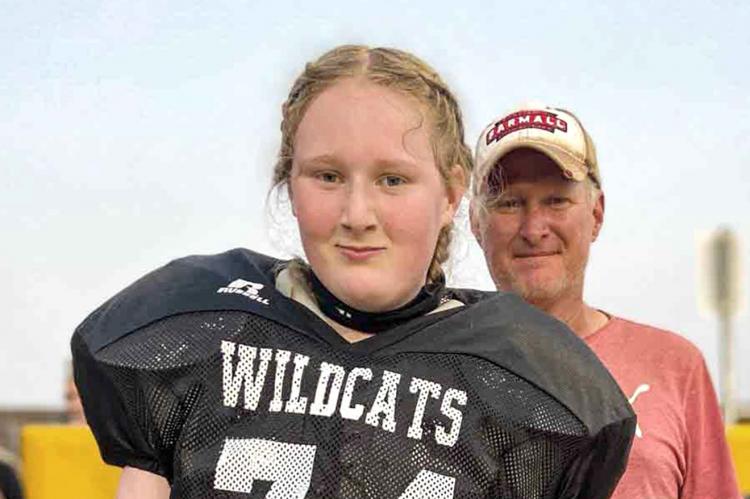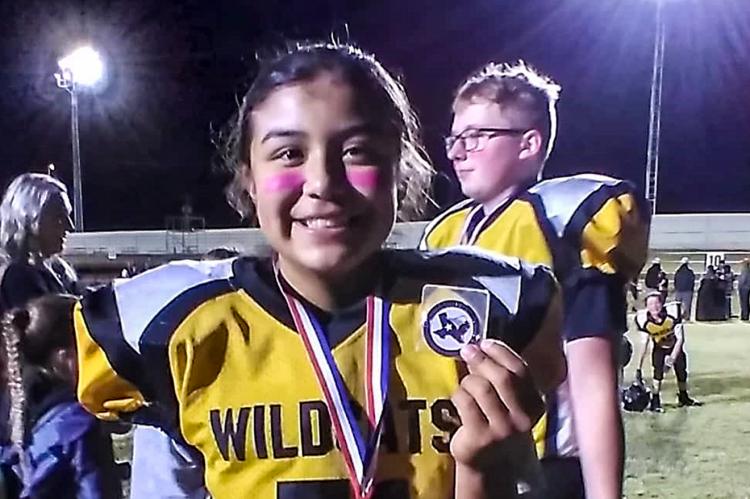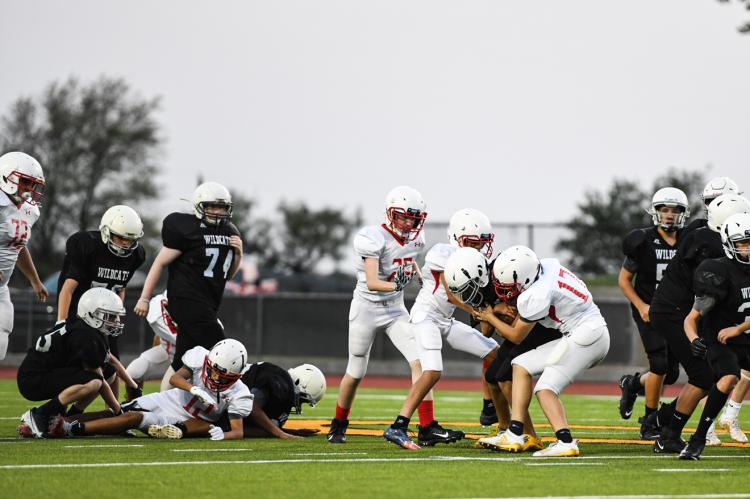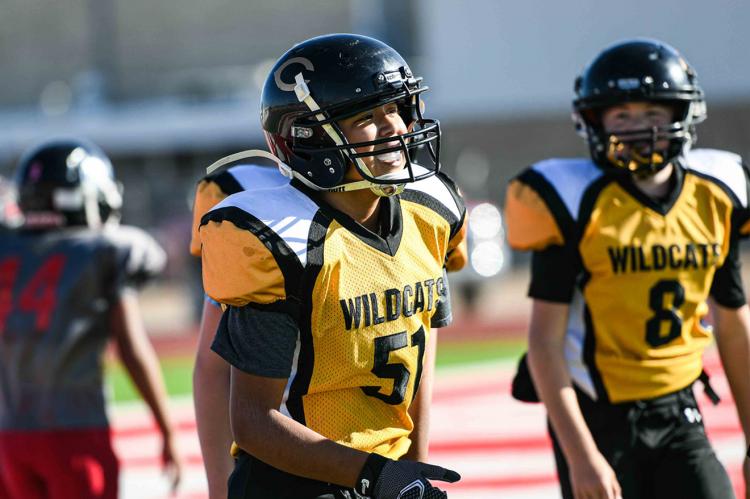Grrrrl Power on the Gridiron
THE HISTORY OF female American football players is a fairly short one.
If you research the topic, you’ll discover a list of remarkable women athletes, like American Olympic gold medalist Mia Hamm or Brazil’s Marta Vieira da Silva—but they play soccer, not football. You’ll also find a variety of youth, high school, college, and semiprofessional leagues—in most of which the female species is carefully segregated from the male, with rare exception. Some even play tackle football, in full pads, for teams with excessively sweet names like the Los Angeles Dandelions and the Philadelphia Liberty Belles.
Unless you want to become a female football coach or a television news commentator, there doesn’t seem to be much of a future for girls, or women, in football.
But try telling that to Canadian Middle School eighth-grader Ellery Yarnold— daughter of former Wildcat offensive tackle and down lineman Kley Yarnold; niece of former Wildcat lineman Bo Dickinson; and granddaughter of another former Wildcat, Bob Dickinson—who just finished her first season playing nose guard and right tackle for the eighth-grade Wildcat squad.
On the first day of practice, Ellery got knocked flat to the ground and found herself lying there with a bloody nose, fighting the urge to throw up. What did she do? “I got up and went back out there,” she said.
Or try telling sixth-grader Sharlene Cervantes, who just finished her fifth year playing Pee Wee and Junior League football. She was named Most Valuable Player in her final regular-season game last month after running in the winning touchdown—in overtime, no less.
Better yet, don’t tell either one of them, because they probably won’t care.
“WHAT MADE YOU decide to play football?” we asked Ellery in an interview at The Record office one afternoon.
“Because my uncles and my dad played,” she said. “I just thought it was the coolest sport.”
So cool, in fact, that Ellery begged her parents for three years to let her play.
Her mother, Kimberly, had watched both of her own brothers battle through knee surgeries and broken ankles as a result of their gridiron pursuits. “Kley’s brother broke his back, so that’s why I didn’t want her to play,” she said.
“We just kept putting her off,” Kimberly said. “Last year, I signed her up for girls athletics. She called me from the school and said, ‘I quit.’”
“That year, I went to PE,” Ellery said.
“And begged and begged and begged,” her mother said.
This year, Kimberly relented. “I said, ‘Fine. Sign up. If you get hurt, don’t call me. Call your Paw Paw.”
In her debut year as a Wildcat football player, Ellery never had to call her Paw Paw, though.
She lost count of the bruises all over her arms—so many that they finally just ran together. She remembers the time an opposing player grabbed her braid, though. “I got faceplanted right into the turf,” she laughed.
There was a video of the incident, too. “You can hear my dad in the background, going ‘Oh, oooooh.’” she said. “I had some turf burn. It was all over my legs.”
Ellery can give as good as she got. When asked about the most interesting thing that happened in a game, she laughed again and said, “I pancaked two kids that were a little bigger than me and a lot heavier.”
Then she added, “I made friends with this one kid before I tackled him. He was pretty nice. We had a conversation before they were ready, and we were talking and laughing.”
“Was he nice after you tackled him?” we asked.
“Yeah.”
“Did they ever make you cry?” we asked.
“No,” she answered, without hesitation. “I never cried once. That’s what it’s like living with uncles and brothers.”
SHARLENE UNDERSTANDS that, too. She grew up playing with her cousins, Aiden and Victor Meraz, and just followed them into the sport like it was no big deal.
Asked whether it occurred to her, when she signed up in third grade for Pee Wee football, that there were no other girls on the team, she just shrugged and said, “No. It didn’t bother me.”
“So, everybody was cool?” we asked.
“They just looked at me funny,” she said.
We wondered how long it was before that funny look changed, and she said it was gone by the second year. “The coaches got on to me a couple of times, but that was just to make me play better,” she said.
Sharlene is quieter than Ellery. When we mentioned having heard she was pretty good, she wasted no words, answering simply, “Yeah.”
“What makes you good?” we asked.
“Running,” she said.
“Are you fast or tough?” we persisted.
“Yeah,” she said.
Sharlene is taller than most of her team. Between her height and her bright-gold socks, she is easy to pick out on the sidelines. But she really stands out from the crowd when she lines up behind the quarterback, takes the handoff, and sweeps down the sideline, headed for the goal line behind well-timed blocks from her teammates.
When we asked Sharlene what the hardest thing about playing football was, she said, “It was hard to suck it up when they hit you hard…and when they get onto you,” she said.
“But you did,” we observed.
“It got easier,” she responded, like the disciplined athlete she is.
“What was the best thing about it?” we wondered.
“Running the ball, at first, makes you feel scared,” she said, “because you see all those boys coming after you. But once I see my teammates go and block them, I feel confident.”
“So, you are friends with your teammates?”
“Yes,” Sharlene said. “When we are in the huddle, the coaches say, ‘This is brotherhood, sisterhood, and all these boys and girls are your brothers and sisters.’”
One of Sharlene’s coaches, Colby Leach, had more to say about his player. “She is very quiet,” he admitted, “but we just gave her the nickname, ‘The Black Widow,’ because, on defense, she was just so tough. She would just run down the field on kickoffs and annihilate those kids.”
“Sharlene was so meek, and just a lady,” said Leach, “She has a heart of gold until it’s time to play football, but she can flip a switch and go tear your head off. As soon as it’s over, there’s the quiet Sharlene.”
“She is athletic, gifted, and strong…and incredibly fast,” he said. “There was always a ref on our sidelines, and he’d hear us say, ‘C’mon, Sharlene!’”
“There’s a girl out there?” the ref would say. “That’s a girl?”
“Yeah, I promise you,” Leach would respond.
One of the team’s routines at the end of practice, Leach said, was a drill with a piece of PVC pipe laid out in a circle. The players would go one-on-one against each other, learning how to block and stay on block. “Sharlene won more times than anyone else,” he said. “She might have lost two times out of a dozen.”
Once the drill was over, Leach said, “You got that beautiful smile. She just whupped every single boy on the team, and she just smiled. We’d circle up to do our Cats Pride thing and put her in the center all by herself.”
Leach said the drill had been called ‘King of the Ring,’ adding, “We had to rename it ‘Queen of the Ring,’ though.”
ELLERY’S COACH, Brandon Wall, was impressed, as well. “Our first meeting with Ellery,” he said, “you could see she was determined to play and was completely focused on football. We told her from the beginning that she would be treated like a football player, and she accepted that with great pride.”
The first practice was an eye-opener for her, Wall said. “It was about 100 degrees outside. She struggled at first, but with great encouragement from her mom, coaches, and teammates, she made it.”
“I believe from that day on, she made her mind up that she was going to do this,” Wall said. “She steadily got better throughout the year.”
There were obstacles, he admitted; “things you don’t normally think about like a separate locker room, a place for her to dress on road games, a seat for her on the bus. We talked about it and always did the best to find her the best accommodations.”
“I think her teammates did a good job of accepting her and treating her like any other member of the team,” Wall said. “They were very respectful in an unusual situation.”
“I believe it takes a lot of courage for her to play football,” he concluded. “Most junior high kids want to fit in, but with her passion for football, she wanted to stand out. She made a great commitment to her team and deserves our respect.”
LOOKING BACK on the season just completed, neither Sharlene nor Ellery showed any regret over their decision to pursue football. Neither did their mothers, both of whom expressed great pride in their daughters.
“Kimberly, what do you think about this girl of yours?” we asked.
“Oh, Lord, help us,” she said, laughing. “That’s all I’ve got to say.”
But it wasn’t. “I told Kley, ‘You know she’s not going to quit,’” Kimberly said. “She’s stubborn. She’s tough. We are both proud of her.”
“Did you ever question whether your daughter should play football,” we asked Sharlene’s mother, Crystal Rodriguez. “No,” Crystal said, “because I’ve always thought a girl could do what a boy can do. I never told her you can’t do this because it’s a boy’s sport. I’ve always said, ‘You can do this, too.’”
“I’m a little hard on her,” she admitted. “In practice, I’m always pushing her, telling her you need to prove to them that you belong on that field.”
Ellery had a few words of advice for other girls who might consider following in their footsteps.
“I hope they follow their dream and don’t let anybody get their hopes down,” she said.
She expressed her gratitude to coaches Chris Koetting and Brandon Wall, acknowledging the effort they made to accommodate her, “because I was a girl, and they had to make things different for me.”
“Coach Wall is a really good coach. He made sure everyone was doing what they were supposed to do and not getting hurt,” she said. “If one kid gets hurt, he’s running over there making sure they’re OK.”
Asked whether she planned to pursue the sport next year, Ellery was emphatic. “There’s no doubt about it. I’m for sure playing through high school…all the way to my senior year.”
Sharlene’s future is somewhat less certain. Asked whether she plans to play football next year, she hesitated. “Only if I can play both basketball and football,” she said.
There was no question, though, that she valued the experience. “I’m very competitive, and I’m very athletic,” she said, “and I loved seeing my family at my games, there to support me.”





